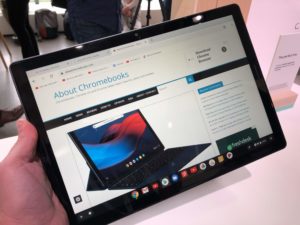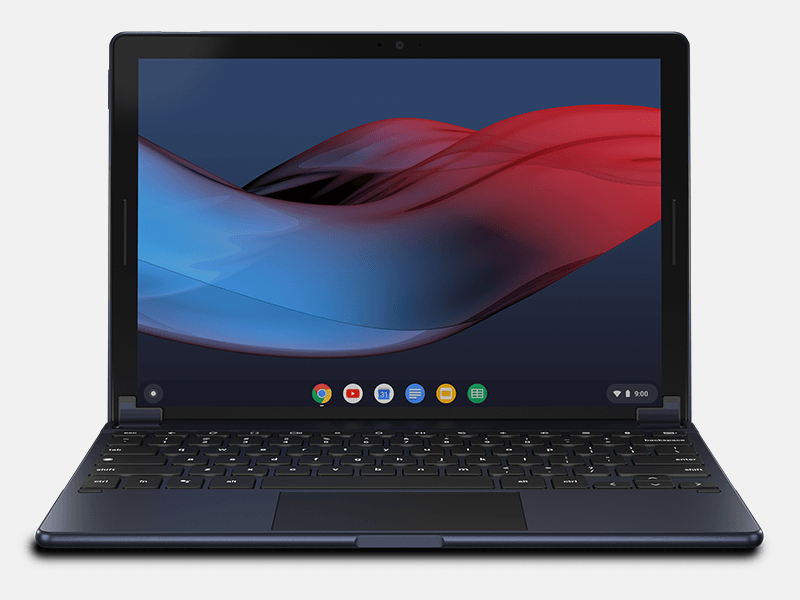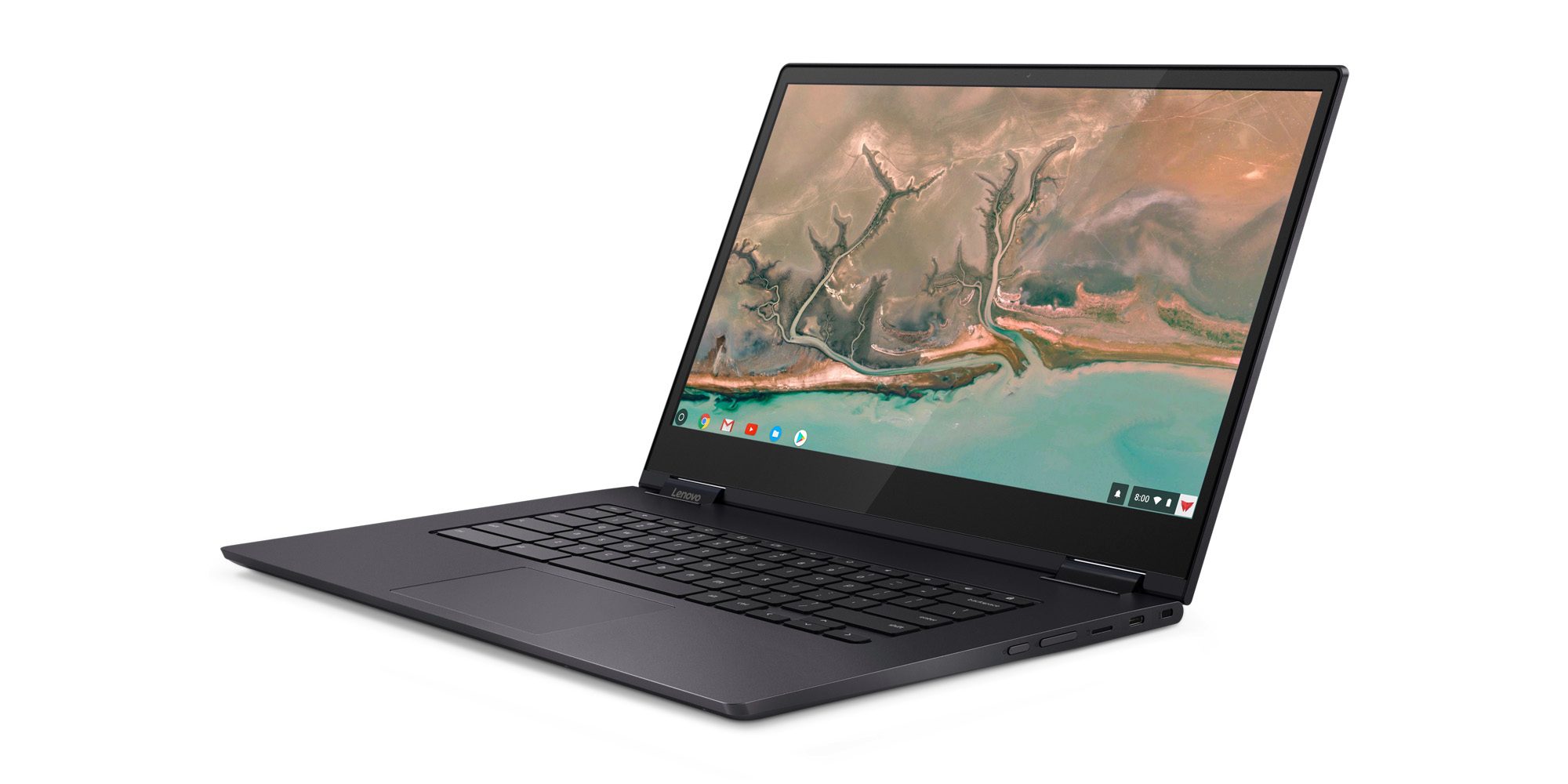More than a week after the Google Pixel Slate was announced, I’m still getting numerous questions from readers asking if they should buy it, and if so, which model to get. I’ll address the second question in a separate post, so today let’s tackle the first one: Should you buy it?
 First, there’s no “one size fits all” device for anyone, so I won’t make big, sweeping generalizations. You need to address your individual requirements because we’re all unique. Where and how I use a Chromebook is likely very different than you. However, we can all apply some similar questions during the purchase decision process.
First, there’s no “one size fits all” device for anyone, so I won’t make big, sweeping generalizations. You need to address your individual requirements because we’re all unique. Where and how I use a Chromebook is likely very different than you. However, we can all apply some similar questions during the purchase decision process.
Second, I’ve been saying for 15 years that mobile technology purchase choices are all about compromise. Do you want portability? You may have to give up screen size or battery life, for example, to get a more portable device. Want the best performance? It will likely cost you more in terms of price and portability. These are just some examples of what I mean.
True tablet or a 2-in-1 Chromebook?
Having said that, it leads into the first question I’d be asking: Do you really need a true tablet computer? I don’t mean a 2-in-1 Chromebook that has a tablet mode. I mean an actual slate that can be used on its own without an attached keyboard when desired.
I actually prefer a tablet that can work with an attached or wireless keyboard. Why? Because at least 50% of my device usage is for consuming content such as YouTube TV, Netflix, and Amazon Prime video. Having a true tablet device is just a more comfortable experience for me — and again, you may not agree or have this preference — than a heavier 2-in-1 or a clamshell Chromebook. If you don’t fall into this category, I’m not sure why you’d even consider the Pixel Slate, except for one reason that I’ll get into shortly.
Of course, there are a few other Chrome OS tablets to consider if you want a slate: the Acer Chromebook Tab 10 if you don’t mind a smaller screen and less performance. Or the HP Chromebook X2.
Yes, the HP does have a keyboard but you can use the slate without the keyboard by removing the display. That gives you two less expensive options in the $330 to $600 range, with the HP providing roughly the equivalent performance of a base Pixelbook for less.
How much performance do you need?
Maybe performance is super high on your list of requirements. In this case, the Core i5 and Core i7 configurations of the Pixel Slate should be considered. These have newer Intel processors than the current Pixelbook, which should eke out some, but not massive, performance gains over last year’s Google Chromebook.
You’ll pay more of course, and not just because of the performance boost: You’re paying for portability and design, as well as having an additional cost for the keyboard. That’s a $160 to $200 premium depending on if you buy the Brydge G-Type or the Google Pixel Slate keyboard.

The Pixel Slate isn’t your only option for performance though. By sacrificing the tablet form factor, you can get comparable, if not better performance from other new devices.
The Acer Chromebook 13 and Chromebook Spin 13, for example, have a range of configurations that use Intel’s U-Series Core processors vs the more power efficient Y-Series expected in the Pixel Slate. When the Acer Spin 13 Chromebook goes on sale shortly, you can get a 2-in-1 device with a quad-core Intel Core i5-8250U paired with 16GB of memory and 128GB of storage at $999.
The same price gets you a Pixel Slate with dual-core Core i5-8200Y and the same 128GB of storage but only 8GB of RAM. Again, there’s some compromise.
Keep in mind that the Lenovo Yoga Chromebook C630 starts at $599 and also uses an Intel Core i5-8250U processor with 8GB of RAM but caps the local storage at 64GB and has a 1080p display. There will be options with 4K resolution screens, which I expect to add around $200 for that upgrade.

So you can get solid performance for less if you’re willing to compromise on display resolution and less portability since the Yoga Chromebook C630 weighs 4.2 pounds. That’s much heavier than the Pixel Slate, which only weighs 1.6 pounds by itself or 2.7 pounds with the Google keyboard.
Don’t forget that the Pixel Slate will come in at least five configurations, so if a tablet is on your wishlist and you don’t need screaming fast performance, you’ve got options. The Celeron model will cost $599 or $699 depending on how much memory or local storage you need.
And if an Intel Core m3 with 8GB of memory is enough horsepower for the way you use a Chromebook today, you can get that in a Pixel Slate for $799; just remember that a keyboard will cost you extra.
Click the link below to continue to page 2


9 Comments
A “Footnote Question”
Do I need to consider upgrading my older Pixel C Android tablet? And is the Slate a choice?
Most used apps for me are: Chrome/Internet Browsing; Gmail (reading more than replying); various apps: weather, Spotify, Kindle and MoonReader, various news apps.
I think that you “need a true tablet” in either one or both of two situations: [1] You already heavily use a tablet/Surface device; [2] you often find yourself wishing that 2-in-1 convertible devices were less heavy, bulky, or awkward for many of the tasks that you perform. I also noted the author’s assertion that a 3000 x 2000 display is a “must have” feature. On small screens like the Pixel Slate’s 12.3-inch screen, everything that’s not an Android phone app will get very small when scaled down from a typical desktop. So high resolution makes comfortable reading feasible. I believe that’s a major factor in why this resolution was added to the HP X2 lineup and why the Surface Book uses it.
Thank you for this review. I was all gung-ho on the Slate but your article reminded me that I’m not dealing with Android here, this is for the Chrome OS, so updates are not a concern. I’m going with HP to get the tablet experience for less.
I’m questioning whether I should just get a Pixelbook on the “cheap” or get a cheaper Pixel Slate model as a secondary device. I want to give them a chance as my main dev machine, so I would be compelled to the i5 model either way.
Great article! I have coveted a Chrome OS tablet for a long time now. But as a Pixelbook owner I can’t justify a Pixel Slate, as it is too similar. Now a 10.5 inch Pixel Slate Mini would fit perfect in my workflow. Something that can take notes in meetings, run Android productivity apps, media consumption, light enough to hold and read and yet powerful enough to run Linux. I think Nexus 7, 9 and Pixel C users are still waiting for a replacement device…
If you are interested in ChromeOS with Linux app support, i7,16 GB of RAM and a big SSD, this new CTL device is has those specs for only $700: https://ctl.net/collections/chromebox-1/products/ctl-chromebox-cbx1-core-i7-version
That’s so much less expensive then the Pixel Slate i7, that you can combine it with an 8 GB Pixel Slate and still save money.
Also, if you expect to be carrying around the Pixel Slate with a keyboard a lot of the time of the time and are concerned about the weight, No Pixel Slate + keyboard option weighs less than the 2.4 lb Pixelbook. Right now you can get an i7/16GB Pixelbook on eBay for under $1,300. It’s also got a touch screen and a 360 degree hinge.
I think it’s unlikely the “Pixelbook 2” will ship this year, but early Q1 feels possible. That’s something to also consider waiting for you. Expect newer processors, higher resolution screen, smaller bezels and a fingerprint reader. I wouldn’t expect the battery life to be much better. The battery-saving properties of the Molecular display are offset by it’s higher resolution with more pixels to drive.
I think you are spot on with your two initial questions, and not coincidentally mirrors my own experience. I was looking for a replacement/alternative to my Android tablet. It still works well, but I was dissatisfied with the software support, particularly security updates. Yet I wanted a tablet with a decent keyboard to use when needed. I knew I wanted better than a Celeron chip. I waited and watched for over a year. Finally I picked up the HP Chromebook X2. For my purposes its M3 provides snappy performance and excellent battery life. I find that I use the device as a tablet about 60% of the time, and use the keyboard as a stand maybe another 25% of the time. I use it much more as a laptop than I ever used my old laptop!
For me RAM is probably as or more important than a faster processor within reason. But I can’t get the slowest processor with more RAM so…
Also the fingerprint sensor is a big deal to me.
One last thing to consider against machines already out a year or so is the slightly longer support period you’ll get with a new-to-market device. My understanding is that support period is calculated not from when the product leaves the retail market or when you buy your particular example but rather when the product enters the retail market. So buying a Slate this winter as opposed to a good deal on the Chromebook Pixel that came out a year or so ago will leave you with a longer support window going forward.
All little things I think about. Because I might pay $1000 for a tablet but I ain’t doin’ it very often.
There is no one-size-fit-all but there is supposed to be one for me. I always want to have a Tablet that can be converted into a laptop. Now what I mean by laptop or desktop is that normally tablet definition is to have less powerful hardware and locked down OS; but this Pixel Slate resolves this type of problem from day 0. Desktop OS, mobile apps support, Linux support, and Windows dual boot coming, but on a tablet and when I attach keyboard and mouse, it works right out of the box. When I use tablet, I can use full desktop browser with mobile apps. It actually resolves all frustrations that we have with iPad Pro! Furthermore, Pixel Slate has full file system, no iTunes transfer kind of BS, and so many things work out of the box just like Mac. I currently own a Pixelbook i5/8GB, but I find that the only problem with Pixel Slate is that it is NOT using fast enough hardware, because it needs to be fanless I get it. But for my use, I need quad core + 16GB RAM because I constantly have 30 tabs opened with 6 Linux apps running in background including handbrake transcoding videos and playing 1080p video at the same time. I wish they have faster hardware but I guess with fanless design, it hits a hardware limit at this century. I am going to sell my Pixelbook and buy a Pixel Slate.